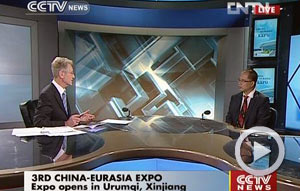Green innovation drives industry evolution
Updated: 2013-09-02 09:28
(cri.cn)
|
|||||||||||
BEIJING -- The annual forum marking the release of the latest TOP 500 Enterprises list in China is now under way in the southwestern city of Kunming.
The event's importance lies in the platform it has created for entrepreneurs to communicate under the current process of transformation to try to seize the pulse of China's economic activity.
CRI's Hu Jia is at the event, telling you more about what concerns and spurs on Chinese business leaders.
This year the summit is being held under the theme: "Branding and Leadership: Developments of China's Large Enterprises amid Economic Upgrading" at a time when China is facing a less welcoming external trade environment and increased internal restructuring pressures.
"For large enterprises here in China, if they have to name their main concern now, it is that they feel uncertain about the future and the economic situation, whether the weakness will continue and how long it will last."
That's Hao Yufeng, director of the research department at the China Enterprise Confederation. He says the rational growth expectation of China's economy has forced domestic firms to drop the approach of seeking extensive profits as they try to find a more sustainable business model.
"I'm interested in the forum on Green innovation driving the evolution of the industry."
That's Ji Rusheng, deputy chief engineer and director of Economic Operation Division of China Pingmei Shenma Group, one of the largest producers of coking coal and thermal coal in the country.
He says that the "Green innovation drives the evolution of the industry" forum is what he's looking into and the topic exactly tackles the needs of the company.
"We should practice green awareness after we finish the initial phase of prioritizing the accumulation of resources. We need to protect the mining ground the moment we start excavating. In the short term, the company will need to spend more investing in this, but it benefits the company in the long-term, even with regard to the brand's image and reputation."
However, export-oriented companies may disagree as to whether it is too early to discuss green innovation when difficulties still exist for shipping our traditional export products.
Yao Wenping, Vice President of the China Chamber of Commerce for Machinery and Electronic Products Import and Export, strongly opposes such views.
She cited Bangladesh, Kenya, and Nigeria as examples of less-developed countries that have successfully safeguarded imported goods with the so-called green standard to their country.
"Green barriers, you could say that. But it also served as a forced mechanism of innovation. Otherwise, our products would not be able to access the foreign market. Thus, we have to constantly upgrade our technology, adapt to the external environment and cater to the demand of overseas markets."
This will transform the country's growth pattern as China will no longer enjoy the edge from cheap labor and exports.
The world's second largest economy is trying to steer itself into becoming an inclusive one by promoting service industries and technological innovation.
Hao Yufeng again.
"The real issue in our discussion of development remodeling concerns the mechanism. Overcoming the obstacles is not about a factory changing its products, say from rice to wheat, but the way we look at things and how we deal with them, as well as the relationship between enterprises and governments.
Whether domestic companies can function as what they ought to, whether governments can behave how they are expected to, that is the crux of the issue."
Recently, the State Council has bulked up its support of relevant industries and enterprises involved in energy saving and technology innovation.
Eligible green companies will be among the first batch to receive corporate bonds for financing.
Foreign firms will enjoy the same preferential treatment as their Chinese counterparts.
Related Stories
Chinese companies expect detailed green measures 2013-08-14 10:54
Farmers fear for crops as S China drought drags on 2013-08-06 07:29
Better environment rests with China's companies 2013-07-05 17:17
China supports shift of resource-exhausted cities 2013-07-04 09:59
Embraco reinvesting to meet green demand 2013-07-02 06:18
Today's Top News
Senior official removed from office in graft probe
Police reveals more about GSK China's violations
Cooperation with Eurasia against terrorism urged
Assad slams Western accusation
Premier Li sees opportunities despite dispute
Xi's visit to Turkmenistan lauded
Trending news across China
Home prices keep rising in August
Hot Topics
Lunar probe , China growth forecasts, Emission rules get tougher, China seen through 'colored lens', International board,
Editor's Picks

|

|

|

|

|

|





